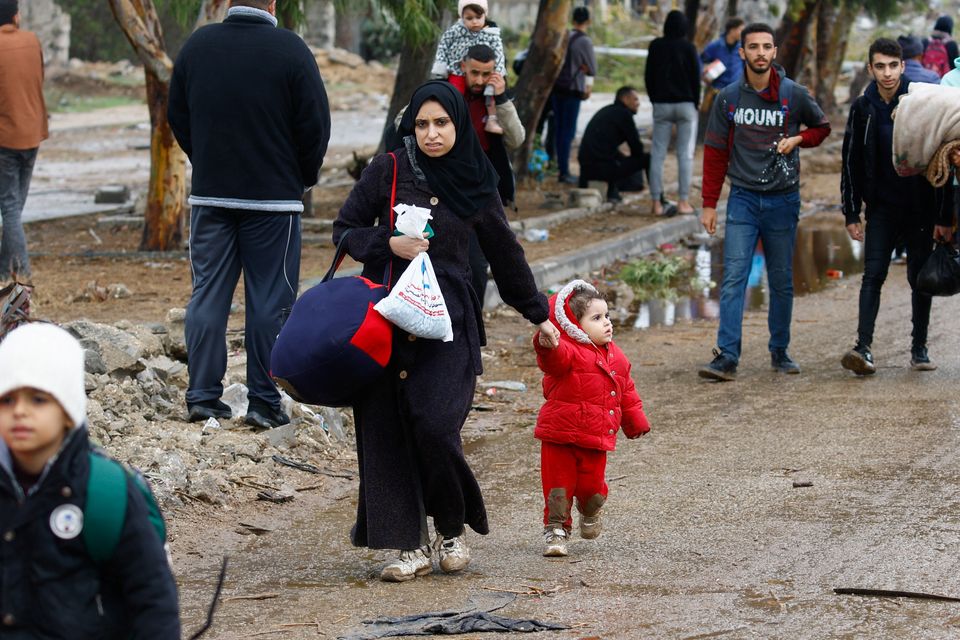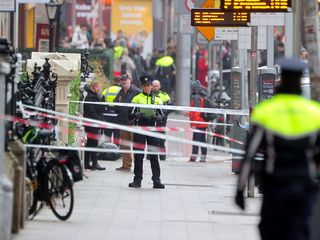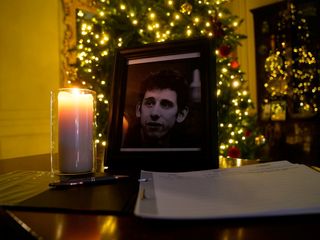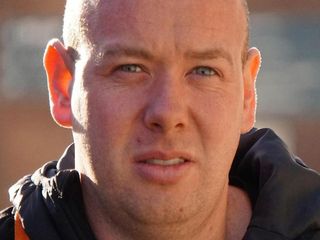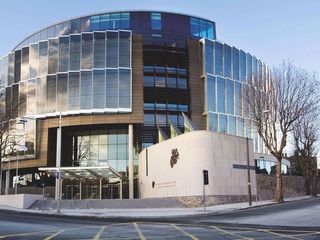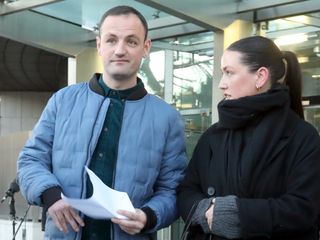- Home >
- News >
- World News
Hamas claims 10-month-old baby hostage and family are dead as Israel investigates
Hamas said the youngest hostage, baby Kfir Bibas, had been killed in an earlier Israeli bombing, along with his four-year-old brother Ariel and their mother.
Gaza latest: Fears for 10-month-old Israeli hostage as humanitarian workers struggle in Gaza
Last-minute negotiations between Israel and Hamas to extend the Gaza truce were overshadowed on Wednesday by an unconfirmed claim by Hamas that a 10-month old baby Israeli hostage and his family had been killed.
Shortly before the final release of women and children hostages scheduled under the truce, the military wing of Hamas said the youngest hostage, baby Kfir Bibas, had been killed in an earlier Israeli bombing, along with his four-year-old brother Ariel and their mother. Their father has also been held.
Hamas infiltrators kidnapped baby Kfir, four-year-old Ariel and their parents Yarden and Shiri after bursting into southern Israeli towns on October 7, killing around 1,200 people and prompting an Israeli military offensive that has killed more than 15,000 people according to Gaza health authorities. Kfir is the youngest of the 240 hostages Israel says were captured.
Video of the incident showed a terrified Shiri clutching the children in a blanket as they were bundled into captivity. Another clip showed Yarden with a head injury from hammer blows, Ofri Bibas, Yarden's sister, said.
Read more
She told reporters the family was not to be included in the expected release of 10 hostages on Tuesday. Relatives of repatriated hostages have been informed in advance by authorities.
Israel said it was checking the claim, which was potentially explosive, as the family were among the highest-profile civilian hostages yet to be freed.
Reuters could not independently confirm the Hamas statement. Relatives had issued a special appeal for the family's freedom after the children and their parents were excluded from the penultimate group freed on Tuesday.
Families of the Israeli hostages due to be released later on Wednesday were informed earlier of their names, the final group to be freed under the truce unless negotiators succeed in extending it. Officials did not say at the time whether that included the Bibas family.
Gaza's Hamas rulers published a list of 15 women and 15 teenagers to be released from Israeli jails in return for the hostages, among the 240 people seized by Hamas fighters in their deadly raid on Israel on Oct. 7.
For the first time since the truce began, the list of Palestinians to be freed included Palestinian citizens of Israel, as well as residents of occupied territory.
A Palestinian official earlier told Reuters that despite a willingness on both sides to prolong the truce, no agreement had yet been reached. Discussions were still under way with mediators Egypt and Qatar, the official said.
Israeli government spokesperson Eylon Levy said Israel would consider any serious proposal, though he declined to provide further details.
"We are doing everything we can in order to get those hostages out. Nothing is confirmed until it is confirmed," Levy told reporters in Tel Aviv. "We're talking about very sensitive negotiations in which human lives hang in the balance."
Once the release of hostages ends, the fighting will resume, he said: "This war will end with the end of Hamas."
Hamas has freed 50 Israeli women and children hostages, along with 19 foreign hostages, since Friday as part of the truce in which Israel has released 150 Palestinian prisoners and increased aid shipments into Gaza.
Israel's chief military spokesperson, Rear Admiral Daniel Hagari, said in a briefing that Kfir, Ariel and their parents were being held by a Palestinian faction other than Hamas. He said Hamas bore exclusive responsibility for them.
Another military spokesperson, Lieutenant Colonel Avichay Adraee, said the family was in the area of Khan Younis in the southern Gaza Strip.
Hamas has not given the locations or condition of the estimated 170 people it still holds.
"The understanding that we will not, for now, get the hug we had so hoped for leaves us speechless," the Bibas' extended family said in a statement to the media.
Jimmy Miller, a cousin, told Channel 12 TV: "Kfir is only 10 months old. He is a child who still doesn't even know how to say 'Mommy'. He still isn't eating solid food. He doesn't have the ability to survive there.
"We in the family are not managing to function... The family hasn't slept for a long, long time already - 51 days."
Last week, Yosi Shnaider, another cousin, described the hostage family as "simple people who thought they were going to live in heaven" - a reference to Kibbutz Nir Oz, the bucolic border village from where they were seized.
Palestinians walk by a destroyed building in Gaza's Jebaliya refugee camp as the ceasefire continues. Photo: AP
Hostages
Hamas and Israel were expected to release more hostages and prisoners on Wednesday, the last day of a prolonged six-day truce in the Gaza Strip conflict, as attention focused on whether mediator Qatar could negotiate another extension.
Israeli media, citing the prime minister's office, reported that Israel received a list of hostages expected to be released by Hamas on Wednesday. The prime minister's office had no immediate comment.
Israel has said the truce could be prolonged further, provided Hamas continues to free at least 10 Israeli hostages per day. But with fewer women and children still in captivity, keeping the guns quiet beyond Wednesday may require negotiating to free at least some Israeli men for the first time.
The Palestinian militant group Hamas and allied group Islamic Jihad freed 12 hostages on Tuesday, bringing the total released since the truce began on Friday to 81. Those have been mostly Israeli women and children along with foreign citizens.
The hostages - 10 Israeli women and two Thai citizens - were aged 17 to 84 and included a mother-daughter pair. All were given initial medical checks then moved to Israeli hospitals where they were to meet their families.
A short time later, Israel released 30 Palestinians from Ofer Prison in the occupied West Bank and a Jerusalem detention centre. The Palestinian Prisoner's Club, a semi-official organisation, said half were women and the remainder were teenage males. That brought the total number of Palestinians released under the truce to 180.
The hostages were among some 240 people seized by Hamas gunmen during a rampage into southern Israel on Oct. 7 in which Israel says 1,200 people were killed. Israel's bombardment of Hamas-ruled Gaza in retaliation has killed more than 15,000 Gazans, health authorities there said.
Palestinian children sell sweets in front of the rubble of a destroyed building in Jebaliya refugee camp, Gaza Strip. Photo: AP
Qatar, which mediated indirect talks between Hamas and Israel that resulted in the ceasefire, on Tuesday hosted the spy chiefs from Israel's Mossad and the United States' CIA.
The officials discussed possible parameters of a new phase of the truce deal including Hamas releasing hostages who are men or military personnel, not just women and children, a source briefed on the matter said. They also considered what might be needed to reach a ceasefire lasting more than a handful of days.
Qatar spoke to Hamas before the meeting to get a sense of what the group might agree to. The Israelis and Hamas are now internally discussing the ideas explored at the meeting, the source added.
Separately, foreign ministers of the Group of Seven nations on Tuesday called in a joint statement for an extension of the ceasefire and more humanitarian aid.
About 159 hostages remain in Gaza. The White House said on Tuesday this includes eight to nine Americans. U.S. national security spokesperson John Kirby said the U.S. was hopeful Hamas would release more Americans, and the U.S. government would work with Qatar to extend the pause in fighting.
"We want to see all the hostages out. The way to do that is these pauses," Kirby told reporters traveling on the president's plane on Tuesday.
Deaths in Gaza
The truce has brought Gaza its first respite after seven weeks of fighting and bombardment that has reduced much of the seaside enclave to rubble. It had been due to expire overnight into Tuesday, but both sides agreed to extend the pause to allow for the release of more people.
Israel's siege has led to the collapse of Gaza's health care system, especially in the north where no hospitals remain functioning. The World Health Organization said more Gazans could soon be dying of disease than from bombing and many had no access to medicines, vaccines, safe water and hygiene and no food.
More than two-thirds of Gaza's 2.3 million people have lost their homes to Israeli bombardments, with thousands of families sleeping rough in makeshift shelters with only the belongings they could carry. They are desperately short of food, fuel and clean water.
"We have a dramatic humanitarian situation. At the same time, we want to have the full release of all hostages, that we believe should be unconditional and immediate. But we need a humanitarian ceasefire in Gaza now," U.N. Secretary-General Antonio Guterres told reporters on Tuesday.
A woman walks with a child, as Palestinians fleeing north Gaza move southward during a temporary truce between Israel and Hamas, near Gaza City, November 27, 2023. REUTERS/Ibraheem Abu Mustafa.
The temporary ceasefire has allowed about 800 aid trucks to enter Gaza, and the first of three U.S. planes with humanitarian supplies for Gaza landed in Egypt on Tuesday.
U.N. aid chief Martin Griffiths was to travel to the Jordanian capital Amman on Wednesday to discuss opening the Kerem Shalom crossing to allow for humanitarian aid to enter Gaza from Israel.
Located at the intersection of Israel, the Gaza Strip and Egypt, the Kerem Shalom crossing transported more than 60pc of the aid going into Gaza before the current conflict.
Aid for Gaza now comes through the Rafah crossing on the Egyptian border, which was designed for pedestrian crossings and not trucks.
Additional reporting from Reuters

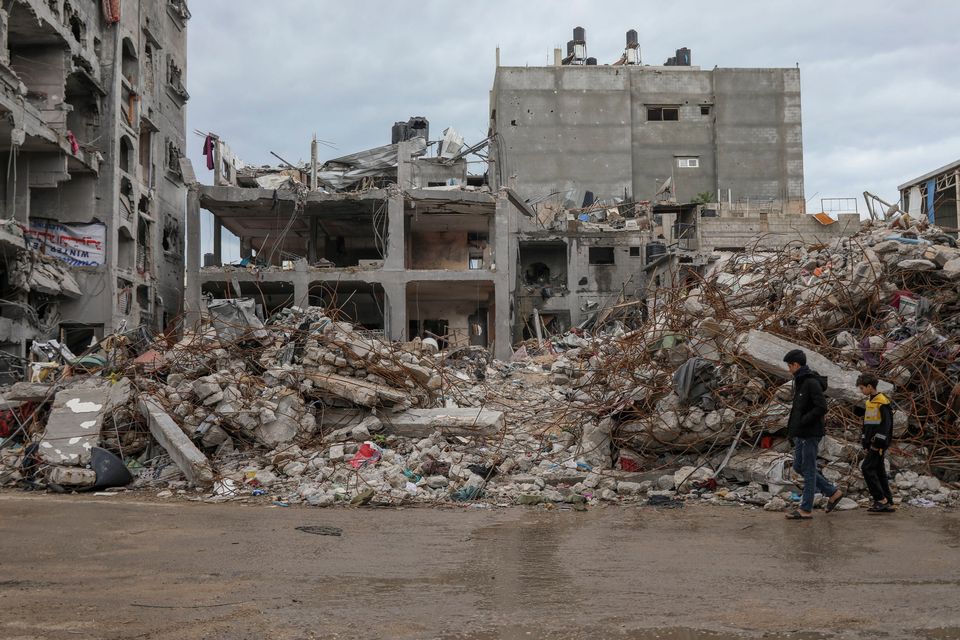
.jpg)
